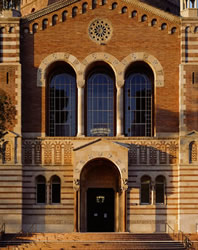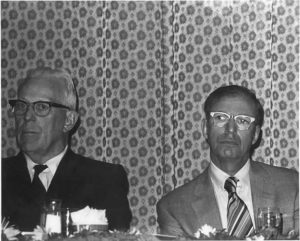History
At the end of World War II, when organized labor in the United States was at the peak of its political power and influence, industrial relations units were established at many universities around the nation. In 1945, Governor Earl Warren established two such units at the University of California: one at UCLA, the other at Berkeley. Clark Kerr, the founding director of the UC Berkeley Institute of Industrial Relations, later recalled, “We came in as the very first effort of this big university to make contact with the trade unions. It was Earl Warren’s way of saying that the unions were recognized as an important part of California society.”
In the decades since its founding, the UCLA Institute has played an important role in the intellectual life of the university, and it also has contributed to the national dialogue on employment and labor issues. The establishment of the Center for Labor Research and Education within the Institute in 1964 further consolidated the ties between the labor movement and the university. But as the power of organized labor waned in the 1970s and 1980s, the Institute was faced with substantial budget cuts. Academic interest in the traditional field of industrial relations also declined during this period. In 1995, however, new leadership came into power at the national AFL-CIO and, soon after, organized labor in California was revitalized, leading to renewed intellectual interest in labor and employment issues as well. This led to a major new initiative in 2000, when the state legislature established the UC Institute for Labor and Employment (ILE), a research program housed jointly at UCLA and UC Berkeley which built on the two IIRs that had been established 44 years earlier.
In December 2003, Governor Arnold Schwarzenegger declared a fiscal state of emergency and eliminated ILE’s budget for the remainder of the fiscal year. In early 2004, after an outpouring of public support, the University agreed to cover most staff salaries through June 2004. Beginning in 2004–05, the work of the ILE was restructured, maintaining the statewide research funding on all UC campuses through a new systemwide Labor and Research Education Fund. Other activities continued to be housed at the UCLA and UC Berkeley Institutes, which both changed their names in spring 2007, and are now known as the Institutes for Research on Labor and Employment. The Miguel Contreras Labor Program, which serves as an umbrella over all the UC labor research and education programs, was approved by the UC Regents in early 2007.
In 2008, the Miguel Contreras Labor Program was targeted for line-item veto by Governor Schwarzenegger, threatening to eliminate both the UCLA and UC Berkeley IRLE campuses. After an outpouring of support (more than 400 UC faculty and academic staff members signed a letter of protest), the University of California, Office of the President agreed to continue funding for the Institutes for that fiscal year.
Despite being levied with continued budget uncertainty in the years after 2008, the UC Berkeley and UCLA Institutes for Research on Labor and Employment have maintained a high level of academic excellence and civic action and continue to reinforce their relationship with the University of California community.
 UCLA Insitute for Research on Labor and Employment 40th Anniversary Conference Recordings
UCLA Insitute for Research on Labor and Employment 40th Anniversary Conference Recordings
IRLE (then the Institute of Industrial Relations) held its 40th Anniversary conference, October 17-18, 1986. New digital recordings of the event are now available to listen and download at the Internet Archive.


